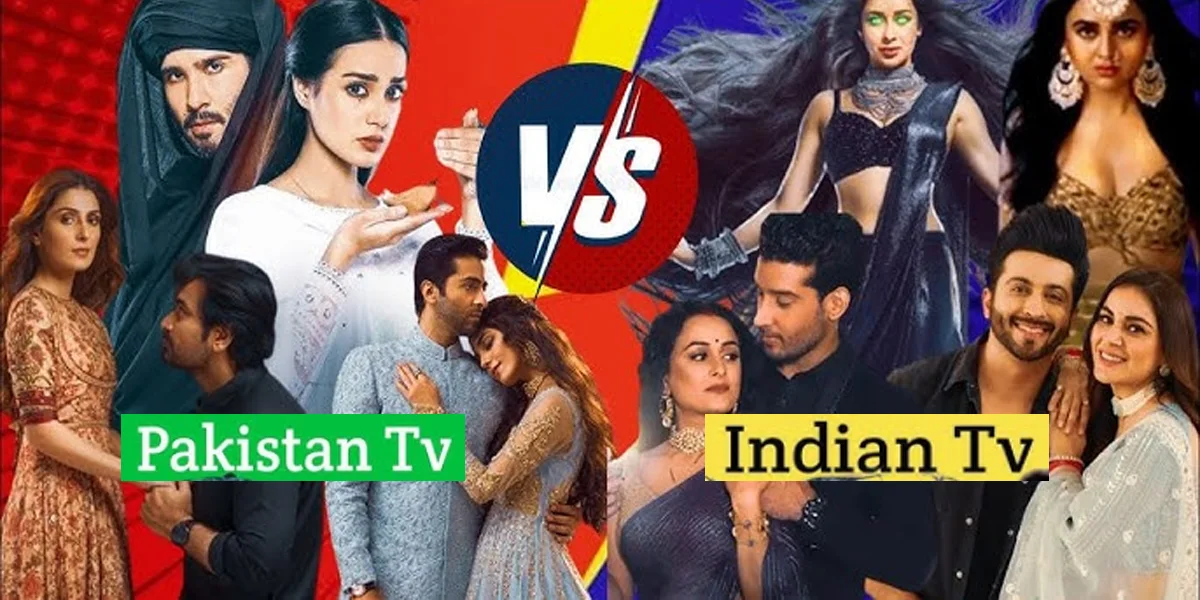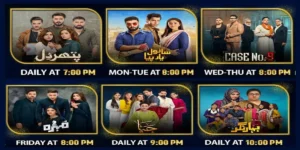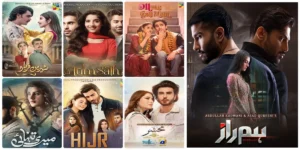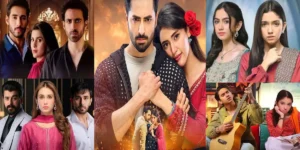In recent years, audiences across South Asia and beyond have turned their attention to Pakistani dramas and increasingly compared them to Indian serials. Many viewers now believe that Pakistani dramas offer something refreshing something more genuine and finely crafted compared to the long-running, seemingly endless dramas produced in India. This article explores the many reasons why Pakistani dramas often look and feel better than Bollywood or Indian television serials. We will dive into factors such as length, storytelling, realism, character depth, production values, cultural resonance and global appeal.
Pakistani dramas have earned respect not just within the country but also internationally. They have reached viewers in India, Nepal, the Middle East and even among the diaspora who appreciate their concise format, strong scripts and realistic portrayal of life. In contrast, many Indian serials are criticised for dragging on, focusing more on spectacle than substance, and losing connection with the audience over time. The difference is more than just language or budget it lies in values of writing, focus and execution.
In this article we will look at key areas where Pakistani dramas shine, citing examples, referencing audience feedback and showcasing what makes them stand out. By the end you should better understand why many viewers choose Pakistani serials over Indian ones. Whether you are a drama fan, a researcher or someone simply curious about comparative television, this deep dive will help you appreciate the craft behind Pakistani storytelling.
Comparison Between Pakistani Dramas & Indian Serials
| Aspect | Pakistani Dramas | Bollywood Serials |
|---|---|---|
| Storyline | Realistic, emotional, and meaningful stories that reflect real life. | Often exaggerated, stretched, and focused on fantasy or revenge plots. |
| Length | Usually 20–30 episodes with a complete story. | Can run for years with hundreds of episodes. |
| Acting Style | Natural, expressive, and emotionally deep performances. | Overacting and loud emotions are common. |
| Female Characters | Strong, intelligent, and emotionally balanced women. | Often shown as helpless, overly dramatic, or stereotyped. |
| Male Characters | Sensitive, emotional, and realistic portrayals. | Usually extreme – either overly macho or too perfect. |
| Direction & Cinematography | Simple, elegant visuals and real-life locations. | Heavy sets, unrealistic lighting, and bright costumes. |
| Music & OSTs | Soulful songs that match the drama’s emotions. | Rarely memorable background music or songs. |
| Cultural Values | Promotes family respect, ethics, and moral lessons. | Often focuses more on entertainment than values. |
| Pacing | Fast-moving and to the point. | Slow, repetitive, and sometimes illogical. |
| Viewer Impact | Leaves a long-lasting emotional and social message. | Focuses mainly on daily entertainment. |
Realistic and Relatable Stories
The biggest reason why Pakistani dramas are better is their realistic approach to storytelling. Pakistani writers focus on real-life issues that people can connect with such as family conflicts, class differences, love, betrayal, and social pressure.
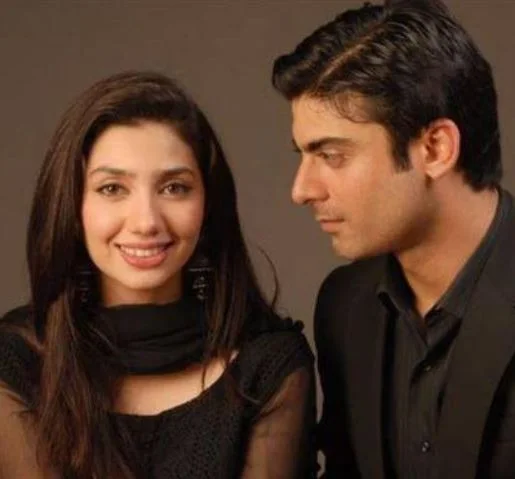
Unlike Bollywood serials that stretch stories with unnecessary drama, Pakistani dramas stay short and meaningful. Every scene and every dialogue has a purpose. Viewers often see their own lives reflected in these stories, making them more emotional and powerful.
For example, dramas like Humsafar, Zindagi Gulzar Hai, and Kankar talk about marriage, ego, and respect themes that exist in every society. That’s why people from India, Bangladesh, and even the Middle East admire Pakistani dramas.
Strong and Balanced Female Characters
Pakistani dramas are known for showing women as strong, independent, and emotionally intelligent characters. In Bollywood serials, women are often shown as victims or overly dramatic figures. But Pakistani dramas focus on real women their struggles, dreams, and courage.
Characters like Khirad in Humsafar, Kashaf in Zindagi Gulzar Hai, and Mahnoor in Kankar are not just romantic leads; they represent real women who make tough choices in life.
These dramas portray how women can be both traditional and modern without losing their identity. That balance is what makes Pakistani stories more meaningful and powerful.
Short and Focused Storylines
Another big difference is the length of the dramas. Pakistani dramas usually end within 25 to 30 episodes, while Bollywood serials continue for hundreds of episodes without a clear direction.
This shorter format keeps Pakistani dramas sharp, emotional, and engaging. There are no unnecessary twists or repetitive scenes just a solid story that moves smoothly toward an ending.
When a drama finishes on time, viewers remember it as a complete experience, not as something dragged for years.
Natural Acting and Emotional Depth
Pakistani actors are known for their natural and deep performances. They don’t overact or exaggerate emotions they express feelings in a way that feels real and heartfelt.
Actors like Fawad Khan, Mahira Khan, Sajal Aly, Yumna Zaidi, and Bilal Abbas Khan have set a high standard of acting with their subtle expressions and emotional control.
In contrast, Bollywood serials often rely on loud background music, repeated reactions, and unrealistic crying scenes. Pakistani dramas focus more on expressions and dialogues rather than unnecessary glamour.
This natural acting style allows viewers to connect emotionally with the characters.
Beautiful Direction and Cinematography
Another area where Pakistani dramas shine is direction and cinematography. Even with limited budgets, Pakistani directors make the most of simple sets and natural lighting. The use of soft colors, real locations, and realistic homes adds authenticity.
Directors like Sarmad Khoosat (Humsafar), Nadeem Baig (Meray Paas Tum Ho), and Saife Hassan (Ehd-e-Wafa) have created visuals that look elegant and relatable at the same time.
Bollywood serials, on the other hand, often use bright, unrealistic sets with too much makeup and glitter. Pakistani dramas prove that you don’t need grand sets to tell a great story all you need is emotional honesty and creativity.
Meaningful Dialogues and Strong Writing
Writing is the heart of Pakistani dramas. Writers like Umera Ahmed, Khalil-ur-Rehman Qamar, Farhat Ishtiaq, and Zanjabeel Asim Shah create dialogues that stay with viewers for years.
Every line has meaning it teaches, questions, or inspires. In Bollywood serials, dialogues are often repetitive or overly dramatic. But in Pakistani dramas, a single line can touch your heart and make you think deeply about life and relationships.
For example, Kashaf’s line in Zindagi Gulzar Hai, “Aurat kamzor nahi hoti, bas samaj use kamzor samajhta hai,” became a powerful statement for many women.
Cultural and Moral Values
Pakistani dramas reflect real Pakistani society its values, traditions, and morals. Even when they discuss bold or modern topics, they maintain decency and respect.
Bollywood serials sometimes cross the line with too much glamour or unrealistic love stories. Pakistani dramas, on the other hand, balance entertainment with ethics.
They teach respect for relationships, family values, and human emotions. That’s why families can comfortably watch these dramas together something rare in today’s entertainment world.
Fresh Faces and Talent
One great thing about the Pakistani drama industry is that it constantly introduces new faces. Many of today’s top stars like Sajal Aly, Wahaj Ali, Yumna Zaidi, and Bilal Abbas Khan started from small roles and earned fame purely because of their acting skills.
In Bollywood serials, the same actors are often seen in multiple shows, which makes it less refreshing. Pakistani dramas, however, always bring something new and exciting. The young talent is full of passion, and they work hard to make every role believable.
Strong Male Characters with Emotions
Pakistani dramas don’t show men as perfect heroes; they show them as humans with emotions, flaws, and struggles. Male characters like Ashar in Humsafar, Murtasim in Tere Bin, or Asfandyar in Ehd-e-Wafa are strong but sensitive they care, they cry, and they respect women.
This emotional side of men makes Pakistani dramas more realistic and heart-touching. In Bollywood serials, male leads are often exaggerated either too arrogant or too heroic. Pakistani dramas show a perfect emotional balance.
Limited but Powerful Romance
Romance in Pakistani dramas is always subtle and meaningful. You’ll rarely see unnecessary physical scenes or over-the-top expressions. The love is shown through eyes, gestures, and simple conversations — which makes it even more romantic.
In Humsafar, the chemistry between Mahira Khan and Fawad Khan was enough to make viewers fall in love with their silence.
This kind of romance feels pure and respectful something that Bollywood serials often lose in their attempt to add glamour.
International Recognition
Pakistani dramas have received global appreciation for their quality. Channels like Zee Zindagi introduced Pakistani shows to Indian viewers, and they instantly became popular. Dramas like Humsafar, Zindagi Gulzar Hai, and Dastaan made people realize that stories from Pakistan are deeply emotional and universal.
Even celebrities from India have praised Pakistani dramas for their depth and simplicity. This proves that storytelling has no boundaries when it’s done with heart.
Music and OSTs Add Soul
Pakistani dramas are famous for their beautiful Original Sound Tracks (OSTs). Songs like Humsafar OST, Tere Bin, and Mann Mayal became iconic because they perfectly matched the emotions of the story.
These OSTs are not just background songs hey become part of the viewer’s emotional experience. Bollywood serials rarely create such deep and poetic music for their shows.
Lessons and Social Awareness
Pakistani dramas often highlight social problems like domestic violence, child marriage, class difference, and women empowerment. Dramas like Baaghi, Kankar, Udaari, and Ruswai brought awareness to real-life issues that people usually avoid discussing.
Instead of escaping reality, Pakistani dramas use it as their strength to teach, inspire, and create change. This makes them not just entertaining but also meaningful for society.
Emotional Connection with the Audience
At the end of the day, the real success of any show is how deeply it connects with the audience. Pakistani dramas make viewers cry, smile, and reflect on their own lives. Every episode feels personal, and every ending leaves a lasting impact.
The balance of emotions, culture, and truth makes Pakistani dramas unforgettable.
Pakistani dramas have truly raised the bar for storytelling in South Asia. They combine real emotions, cultural depth, and strong writing something Bollywood serials often miss.
While both industries have their strengths, Pakistani dramas stand out for their simplicity, sincerity, and soul.
Whether it’s Humsafar, Tere Bin, or Kankar, each story reminds us that good drama is not about how long it runs it’s about how deeply it touches your heart.
READ MORE: Why Family Rivalry Stories Are Dominating Pakistani Dramas

